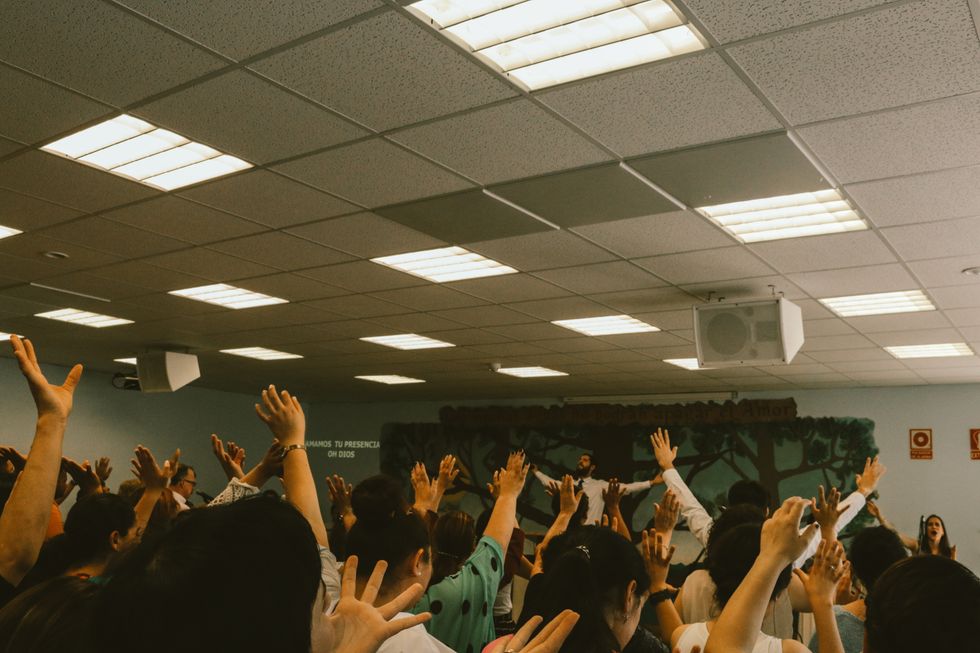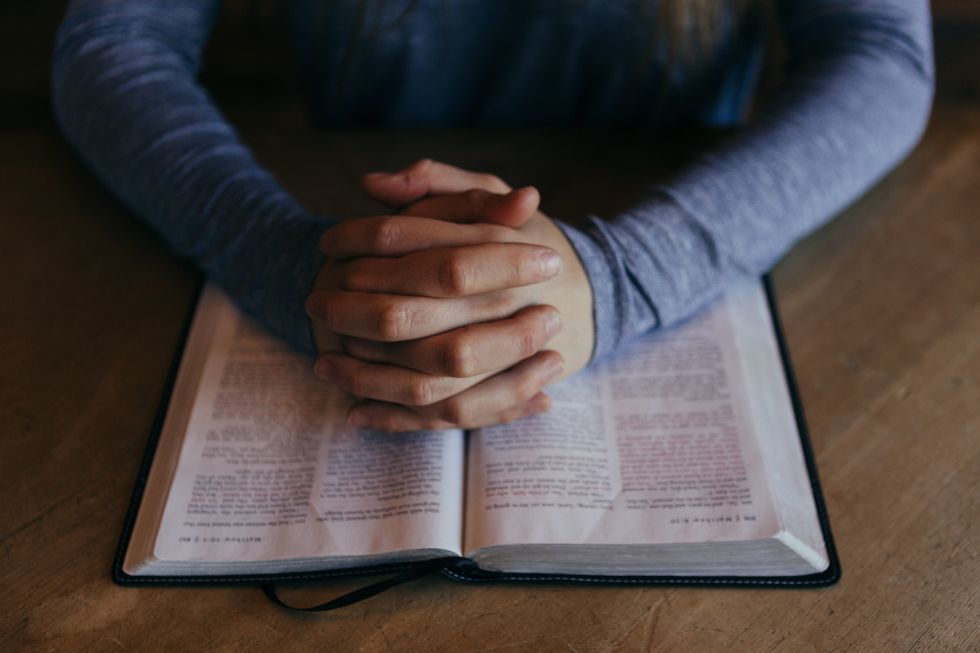I have always been a Christian. I was prayed over in the womb when the doctors said I would come out disabled and advised my mother to abort me. I was christened in my church wearing my nice little white dress, and I was raised in the same church my entire life from Sunday School to adult church.
I am technically the fifth oldest member of my church after my parents, sister, and another member since my parents were there from the beginning. I chose to get baptized in my church at 16-years-old, and I have been serving in church on the AV Team since high school. I participate in the youth group and have volunteered during many of my church's outreaches and events.
In other words, I have never NOT been a Christian, and I have been a faithful churchgoer and participant my entire life. However, I have never really had a devotion life of my own. I have always kind of depended on the faithfulness of those around me: my family and my church. If asked, I would say, yes, I am Christian, but if you were to ask me anything about my faith, you would find me lacking in answers quickly because I had never bothered to go deeper in my faith myself.
I barely prayed beside grace over food and a quick, maybe 30-second prayer before bed. I opened the Bible only in church or maybe every few months when I felt inspired. I sang along during service, but I would often find myself daydreaming or focusing on how I or those around me sounded. Sometimes, I would end up fighting sleep during the sermon because I always went to bed too late the night before, and sitting down for an hour is not conducive to staying awake. I just never bothered to go beyond what I got out of the Sunday service, building my faith around one day of the week.
Recently, I decided to change all that. I wanted to grow in my faith and really learn all about this rather significant part of my identity, deciding to embark on a dedicated spiritual walk. I tried and faltered a lot this last semester, and I only really improved after I joined Gospel Choir on campus. I had spoken about the fast we did before our bi-annual concert and how much of a breakthrough it was for me in another article. Since then, I have been praying more often, reading the Bible daily, doing research, listening to sermons, etc.
However, there are four things I realized no one really teaches you to do because they expect you to just develop the skill over time. I have been at this for 20 years, and I can assure you we all do not just magically know how to do such things. These four things I am struggling with daily and some days are easier than others. I had to do a lot of research to even begin tackling them, reading numerous articles and watching sermons for help. I also have consulted the Word itself, the ultimate resource in this belief system, and sometimes, I will admit that I am still lost and questioning. Still, I have decided to write about it while I am currently on yet another fast that my church is doing corporately.
How to pray

No one really tells you how to pray. They just tell you to do it, and when I tried to do that, I quickly found myself plagued by many thoughts.
Am I praying right? How long should I pray? Should I present my requests or is that just taking advantage of God? How much is too much? Am I doing enough? Do I have to pray kneeling? Do I have to pray aloud? Should I pray in public? And so on.
I feel first we should consult the Word on such matters which can clarify some of these, but I did not come here to offer answers because I still have many questions. I simply wish to confess my own struggles and some of what I have uncovered.
"And when you pray, do not be like the hypocrites. For they love to pray standing in the synagogues and on the street corners to be seen by men. Truly I tell you, they already have their full reward. But when you pray, go into your room, close the door and pray to your Father, who is unseen. Then your Father, who sees what is done in secret, will reward you. And when you pray, do not keep on babbling like pagans, for they think they will be heard because of their many words. Do not be like them, for your Father knows what you need before you ask Him." (Matthew 6:5-8 NIV)
So, we are told to pray primarily in private because those who often pray publicly are doing so to appear holier than those around them in an attention-seeking manner. There are, however, I believe, exceptions. Corporate prayer, for one. Also, if someone asks you to pray over them, I feel that too may be done publicly if you are in such an arena but done in such a manner that it does not impede or disturb those around you. Same for small prayers to yourself.
We are also told to be succinct in our prayer because the Lord knows what we want in our hearts. We need not use grandiose words and repeated supplications to sound great and holy. Come as you are with the way you speak and be simple about it.
The reason we pray is not so God knows what we want Him to hear or do. He already knows that. However, He wants a relationship with us, and communication is important in relationships. He wants us to take the time to talk to Him and stay aware of Him. If you were in a relationship, it is one thing to know someone cares about you and occasionally thinks about you, but you still would prefer to talk with your significant other often enough.
Following this passage in the Bible, we are presented with the Lord's Prayer. There is debate on what it is meant to be: an actual prayer or an outline for prayer to be adapted to one's circumstances. The second potential role was brought to my attention by Pastor Michael Todd from Transformation Church when I watched his series called "Charged Up" on YouTube.
Since then, I have taken it as both. I shape my major prayers to that format, but I still pepper my day with quick little prayers. With requests, however, I have found passages that reassure me my needs and requests are not burdensome. The Lord's Prayer mentions "give us this day, our daily bread" which is a request for provision, and the following verses also speak on it.
"Ask and it will be given to you; seek and you will find; knock and the door will be opened to you. For everyone who asks receives; the one who seeks finds; and to the one who knocks, the door will be opened. Which of you, if your son asks for bread, will give him a stone? Or if he asks for a fish, will give him a snake? If you, then, though you are evil, know how to give good gifts to your children, how much more will your Father in heaven give good gifts to those who ask him!" (Matthew 7:7-11 NIV)
"Beloved, if our hearts do not condemn us, we have confidence before God, and receive from him anything we ask, because we keep his commands and do what pleases him." (1 John 3:21-22 NIV)
"Take delight in the LORD, and he will give you the desires of your heart." (Psalms 37:4 NIV)
There is so much more in regards to prayer in the Word, and I still have questions on certain things, so my search is far from over. Onto the next point though.
How to worship

Worship is more than just singing songs in church, and I even struggle with that. There is a difference between worship and thanksgiving, I quickly learned while researching. Thanksgiving is praise for what God has done while worship is adoration for who He is.
"But a time is coming and has now come when the true worshipers will worship the Father in spirit and in truth, for the Father is seeking such as these to worship Him. God is spirit, and his worshipers must worship in the Spirit and in truth." (John 4:23-24 NIV)
"Praise the LORD. Praise God in his sanctuary; praise him in his mighty heavens. Praise him for his acts of power; praise him for his surpassing greatness. Praise him with the sounding of the trumpet, praise him with the harp and lyre, praise him with timbrel and dancing, praise him with the strings and pipe, praise him with timbrel and dancing, praise him with the strings and pipe, Let everything that has breath praise the LORD. Praise the LORD." (Psalms 150 NIV)
When I sing praise in church or at Christian events, I have fun, but I am often too focused on being the loudest, the most jubilant, hitting those notes, hiding the crack in my voice, listening to others, etc. Often, the songs are mere words on my tongue with no heart or meaning behind them.
When they call for everyone to yell, pray aloud, or show our thanks and joy, I am oft too reticent to raise my voice. Just an awkward whoop because I am self-conscious of what others around me are thinking while there is someone unconcerned with such a row up crying or someone else is running around, screaming.
I have never been so caught up in the Spirit to do such things. Well, I have cried more than once when someone prayed over me because they always came in with those God-given insights that hit the exact spot I was hurting, and the next thing you knew, I was sobbing, but I have never been the one so overcome that I had to just throw my arms up and shout with everything I have. I have definitely never spoken in tongues either.
"For anyone who speaks in a tongue does not speak to people but to God. Indeed, no one understands them; they utter mysteries by the Spirit." (1 Corinthians 14:2 NIV)
Even when I am alone, I am too awkward to be loud, to raise my voice to say His name or that I love Him. I cannot call out for His grace and mercy. I would be watching a sermon when I am alone, and the preacher would call the patrons and listeners to say "Amen" or "Holy," etc., and I would mumble it before looking around like someone could hear me.
I learned that I never learned to forget myself when I worship. I am always so focused on myself and what is around me rather than focusing my attention on Him. I have never freed myself from my insecurities enough to let go and just be wholly focused on Him.
Even in prayer, I would often get distracted or awkward when it came to the praise aspect because I did not want to do it wrong or sound bad or not holy enough, like I was not saved and under the grace of God, loved and accepted with all my flaws.
It is definitely something I am working on slowly. I have been advised by my readings to put myself in the mindset of praise by reading the Bible and praying first, sometimes for a clear and focused mind or a worshipping heart, unafraid. I have had mixed results, but I am building up my "stamina" alone, singing along to gospel music and praying when I feel moved to it.
I am also learning the Lord's various names to call on and praise the various aspects of Him. He is Love, Refuge, Shepard, Lion and Lamb, Salvation, Redeemer, King of Kings, Faithful, Ever-Present, Holiest of Holies, and more. I have found saying some of them inform or, at least, loosen up my praise, helping me to focus on how He has been each of them in my life.
How to hear God’s voice

Yeah, I still have little on this. I am trying to learn and apply whatever it takes to hear Him. I have said before that prayer is meant to be the way believers talk to their Father. It is supposed to be a conversation, not a monologue or a list of requests, love you, amen, bye.
When you pray, you are often told to let the Spirit guide you where you are prompted, and you find yourself praying about things or people you had not planned on praying about. Also, many recommend you leave time at the end of your prayer to listen for His voice if He chooses to speak to you. Often, it is said that God is always speaking to us, but we do not always stop to listen because we are busy, distracted, or cannot recognize His voice.
"And after the earthquake a fire; but the LORD was not in the fire: and after the fire a still small voice." (1 Kings 19:12 KJV)
His voice is described as a "still small voice" or "a gentle whisper" which explains why it can be hard for many to hear him because often we are so distracted. Our thoughts are loud and plentiful, and we are constantly speaking and doing, so how can we hear such a small voice?
The Word is meant to be Him speaking to us, and our prayer is us responding back. Often, when people hear God, they describe it as a verse coming to mind or a sudden urge to do or not do something. Sometimes, they just get a feeling they should not go somewhere or that they should call a certain person.
There are those testimonies of a person canceling a vacation trip when they felt something in them tell them to, and then, they later found out their plane crashed, killing everyone aboard as it was in the case of Andrew Wommack, or someone suddenly felt the need to reconcile with an estranged loved one who ended up dying the next day.
So, how should we hear God's voice? Shrug. I do not know for sure, but I sure am trying.
"He says, 'Be still, and know that I am God; I will be exalted among the nations, I will be exalted in the earth.'" (Psalms 46:10 NIV)
Since the Lord's voice is so small and still, I too should be still and make small my distractions, carefully quieting my mind to be able to hear passed my Red Bull hyped thoughts. I have been taking the time to pause at the end of my prayers when my mind is most clear to try to listen.
I also plan to start carving out quiet moments during the day to keep an ear out, and also, I am working on reading the Bible more and taking much of it to heart because those are His words, and it is best how He communicates with me because nothing He would say to my spirit would be in contrast to what His Word says. I want to learn how to differentiate between Him and my own thoughts going forward. It is difficult, but I believe it takes dedication and practice.
The word "listen" in the Bible is often translated from the Hebrew word "shema" which means to listen, pay attention but also to obey. So, I seek to learn to listen and obey as we are called to do, so I may invite Him in always.
"Here I am! I stand at the door and knock. If anyone hears my voice and opens the door, I will come in and eat with that person, and they with me." (Revelations 3:20 NIV)
"My sheep listen to my voice; I know them, and they follow me. I give them eternal life, and they shall never perish; no one will snatch them out of my hand." (John 10:27-28 NIV)
How to biblically meditate

"I meditate on your precepts and consider your ways." (Psalms 119:15 NIV)
"My eyes stay open through the watches of the night, that I may meditate on your promises." (Psalms 119:148 NIV)
"I will consider all your works and meditate on all your mighty deeds." (Psalms 77:12 NIV)
"Keep this Book of the Law always on your lips; meditate on it day and night, so that you may be careful to do everything written in it. Then you will be prosperous and successful." (Joshua 1:8 NIV)
"I remember the days of long ago; I meditate on all your works and consider what your hands have done." (Psalms 143:5 NIV)
"Within your temple, O God, we meditate on your unfailing love." (Psalms 48:9)
"Blessed is the man who does not walk in the counsel of the wicked, or set foot on the path of sinners, or sit in the seat of mockers. But whose delight is in the law of the LORD, and who meditates on his law day and night." (Psalms 1:2 NIV)
"Tremble, and do not sin; Meditate in your heart upon your bed, and be still." (Psalms 4:4 NASB)
Yeah, the Bible talks about meditation a lot, primarily in Psalms, but often the term is used throughout the other books as commands or a record of a person meditating. When I first really dealt with this word, I thought first of mindful meditation, legs crossed, eyes closed, and focusing on my breathing, but that did not seem right. I was told to meditate on a lot of things, including the Word. How was I supposed to go about that?
Well, first off, meditate, in this case, means to ponder deeply, to search, to reflect, to dwell, to contemplate, to study, to turn over in one's head over and over, to mumble to oneself, and so on.
Meditation, in all its forms, is not a quick process. It takes time, but I have learned that the biblical version calls us to delve deeper when it comes to our faith. We must look past the surface of everything, including the words of each verse. What is being told to us? What does it tell us about God? About us? What is expected of us? Etc.
In what I have read, we are to not only read the Word but seek to understand it. We are meant to take it to heart, memorizing it and reciting it until it is secure in our hearts so that it can shape our thoughts and inform our actions and keep us from straying.
"I have hidden your word in my heart that I might not sin against you." (Psalms 119:11 NIV)
The Word is supposed to become one with us, coming forth when we are lost or confused, bringing instruction, reminders, or comfort. We are called to ponder it often, to remind ourselves of it, to seek after it, and it can be hard because it requires time and intention.
"Let the message of Christ dwell among you richly as you teach and admonish one another with all wisdom through psalms, hymns, and songs from the Spirit, singing to God with gratitude in your hearts." (Colossians 3:16 NIV)
No one taught me about these things. They have mentioned them but never really went into explaining how to go about doing them. If they did, it was not enforced. I had to find out a lot on my own, many things I did not even know I did not know until one pastor or the other mentioned it, prompting my own research, and I still seek more knowledge and work towards understanding and applying what I learn to my life.
I am certain I am not alone in my confusion or lack of knowledge, and I hope that any who seeks out answers on their own as well as luck and blessing. Remember, seek and shall find, and if you are need of wisdom, ask of it from God with the belief that He will grant it.
"If any of you lacks wisdom, you should ask God, who gives generously to all without finding fault, and it will be given to you. But when you ask, you must believe and not doubt, because the one who doubts is like a wave of the sea, blown and tossed by the wind. That person should not expect to receive anything from the Lord. Such a person is double-minded and unstable in all they do." (James 1:5-8)
So, truly believe it, and you shall truly receive it. So is the promise of God.



















